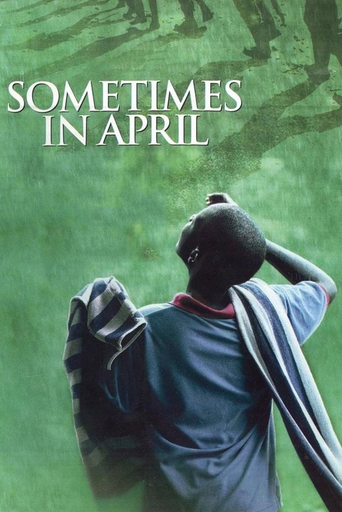missmirtha
I'm deeply moved and very impressed by this film. It's no doubt the kind of film that sticks in your mind-you'll keep thinking about it for a VERY long time. Raul Peck's 2005 film "Sometimes in April" takes place in Rwanda, during the Rwandan genocide, which went on for a hundred days. Nearly a million Tutsis and moderate Hutus were killed. As the film's title tells us, the start of the genocide was in April 1994. Having traveled in Rwanda myself, this is a film I've wanted to see for a long time, and it did not let me down! In my opinion this film comes across as more realistic than the better-known and more Hollywoodized "Hotel Rwanda", which is more of a hero/love story. "Sometimes in April" gives a more honest description of how something like this can happen in the modern days. The film was shot at different locations in Rwanda, which contribute to make the film even more realistic. This is the real deal, the real story of what happened. At the same time, it's not so graphically violent that it's impossible to watch. This is an important and necessary film. The fact that it's not over-brutalized makes it possible for more people to watch it. It's also very informative, for those who want to learn more about what happened outside of their doorstep! The actors do a formidable job in making this film as realistic as can be. Carole Karemera immediately captured my heart as the Tutsi-woman, Jeanne, who is married to a Hutu-man. Idris Elba also does a great achievement as her very handsome husband, Augustan, who has a heart of gold. Of the more familiar faces, we find Debra Winger and Dan Barlow. It's very hard to capture the real essence of this film; how people can turn around and become brutal murderers, and kill their friends and neighbors. That's why the film should have focused more on the background and the propaganda against the Tutsis, as this was the main tool to change the people and turn the country upside down. The film is also 140 minutes long, which can be a bit too much. The film has beautiful music and images of the Rwandan nature. The first sentence in the film; "When did paradise become hell" gives a good description. I watched the movie by myself on a rainy Wednesday night, and it was not just outside it was pouring down! If you start to cry it WILL make you cry till the end. So maybe I do have more than just a general interest in the topic and I have a relationship to the country Rwanda, but I honestly think this is a film that everyone should watch.
Angeneer
Sometimes in April is not boring, however it's way far from being introspective and realistic.Pedantry oozes from every inch of the celluloid. The director hasn't given enough effort to explain the "why". It's only about the "what" and a reduced, possibly one-sided version of the "what" it is.The film is heavily oriented towards western audiences (it pushes the right "western" buttons). Some things that resonate with the western mentality simply do not register with Rwandan audiences. Some other things that touch on local psyche and actually explain the flow of events in Rwanda are not even explored here.So can the viewer learn anything about the conflict from this movie? I'm not sure at all. The only safe outcome is that war is bad, but you knew that already.
kayabay
As Martin Luther King Jr. stated, "In the end we will not remember the words of our enemies, but the silence of our friends." And the movie starts with these words which makes you think all through it, who really are your friends.A perfect political drama to remind all mankind to think twice why and how the genocides happen, and what reaction do humanity take before all is gone. In history, many genocides known well or slightly remembered are all shame, and we have to remind every single human being that they're not as far as they guess.Besides the evil that's in us, the greed of power and social actions that confront, genocides must be the stamp of evil which we must never forget and take every precaution not to realize ever.Raoul Peck, took a very hard job and done it with dignity, simplicity and most importantly presenting the "reality" as it is. So gets the movie more impressive.The casting is also superb with all natural African originated artists. Debra Winger is a surprise to see as a US bureaucrat who try to intervene the situation.A must see movie, over and over again.
drv-3
As a career Army Officer, I'm no stranger to the horrors of war. I'm ashamed to say that like most Americans, in the past I've written off Africa in my mind as a bankrupt continent, unable to govern itself effectively, led by corrupt, murderous thugs only interested in lining their own pockets at the expense of their population.However, this movie reminded me that regardless of our nationality, race or religion we are all human beings with hopes, dreams and ideals. How can it be that in these modern times, human beings can be so cruel, foul and inhumane to systematically slaughter over a million people simply because of some artificial class distinction invented by Belgian colonizers? I'll never be able to purge from my mind the scene of the killers sharpening their machete blades by dragging it along the street prior to pouncing on unarmed men, women and children.For me, this movie forever changed my view of Africa and its population. I can only hope that next time (and somewhere in this world there will be a next time) the West will intervene and prevent such a slaughter.



